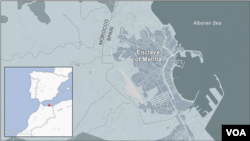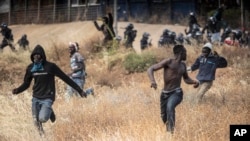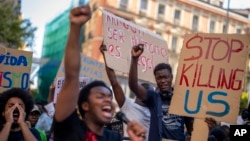Rights groups are pressuring Spain’s government over the deaths of at least 23 people after thousands of migrants forced their way through the European Union’s only land border with Africa between Morocco and the Spanish enclave of Melilla.
In the worst tragedy on a European frontier in recent years, the migrants died in a crush, and scores more were injured, when about 2,000 people, many from Sudan, stormed the 6-meter-high fence to try to get through the border on June 24. The Moroccan Association for Human Rights (AMDH) said another 77 people were missing after the incident.
Spain’s state prosecutor and the country’s ombudsman have opened investigations into the incident, and their conclusions could prove politically damaging to Madrid and Rabat if they challenge the official version of events.
Migrant aid groups and opposition politicians have accused both Spain and Morocco of covering up what really happened to the migrants and failing to account for missing people.
Contradictions
Two separate media investigations have suggested at least one migrant died on the Spanish side of the border, contradicting the Spanish government’s insistence that no one died on Spanish soil.
Beyond last June’s incident, the Council of Europe’s Human Rights Commissioner said last week migrants in Morocco had “no genuine and effective” access to asylum in Melilla, leaving them with little choice but to try to cross illegally.
Both the Spanish and Moroccan governments have defended the actions of their security forces, saying the migrants had been violent, and police had used reasonable force.
The ongoing controversy raises questions regarding not just the Melilla incident, but how a key European Union border with Africa is policed.
Hours after migrants burst through the border, shocking footage was published by AMDH of Moroccan gendarmerie officers walking among what appeared to be scores of bodies.
The heavily defended borders between Melilla and Ceuta, Spain’s two North African enclaves, and Morocco have long been the flashpoint between well-armed security forces and migrants hoping to make a new life in Europe.
The Spanish interior minister repeatedly has insisted that no deaths occurred on Spanish soil, thereby absolving Madrid of any responsibility for the tragedy.
“I have said it before, and I will repeat it again: We are talking about tragic events that took place outside our country. There has been no loss of life on national territory,” Fernando Grande-Marlaska said last week in the Spanish parliament during a stormy session.
He said that while he “sympathized” with the causes, such as wars that have pushed people to try to migrate to Europe, he added “that does not justify a violent attack against the borders of a country.”
Naser Burita, the Moroccan Foreign Minister, said last week during a visit to Spain, that this was “not a normal incident, not in its origin or how it happened. It was very violent.” He said the circumstances justified the way Moroccan police controlled the incident and said it was handled in a “responsible” way.
Right to claim asylum
Elena Munoz, legal spokesman of the Spanish Commission for Refugee Aid, an NGO, said in the June incident that 460 people were returned from Spain to Melilla without the right to claim asylum, thereby contravening international migration law, which states migrants should have 24 hours to make this claim.
“There are two investigations underway from the state prosecutor and the ombudsman to try to find out what happened. Already, the Council of Europe has said it is impossible for migrants to claim asylum in Melilla, so they must climb over the fences,” she told VOA.
“This is a delicate situation [for the government]. On all the land and maritime borders with Europe, human rights must be respected. People must be allowed access to the right to asylum.”
The Melilla tragedy has proved to be a political headache for Spain’s minority government, with some of its normal allies criticizing the leftist coalition over the issue.
“It is not acceptable that in the face of the evidence and investigations over the facts, the government and the minister deny everything,” Jon Inarritu, a lawmaker for the Basque nationalist EH Bildu party, which is a political ally of the ruling Socialist party, told VOA.
“This is the worst incident to happen on the Spanish and European frontier [and it] should be cleared up as soon as possible.”
In an initial report in October, the Spanish ombudsman condemned “excessive and lethal use of force” by Moroccan and Spanish law enforcement forces, but the ombudsman has yet to deliver its final findings.
Lighthouse Reports, a Dutch media organization that worked with four major European media outlets including the Spanish daily newspaper El Pais and France’s Le Monde, published an investigation last week that asserted at least one migrant died on the Spanish side of the border.
It showed an image of what it said was an African migrant on the Spanish side of the frontier.
A BBC documentary broadcast on November 1 said video footage showed “at least one dead body” at the entrance of the Melilla border post, as well as other bodies being removed by Moroccan security forces.
Spanish authorities confirmed that this area “was under their control,” the BBC reported.
A spokesman for the Spanish Interior Ministry, who asked not to be named in accordance with practice in Spain, told VOA it did not want to add anything to the comments of Grande-Marlaska in parliament.
In 2014, 15 migrants drowned trying to swim from Morocco to Ceuta after Spanish police in Ceuta, the other Spanish enclave in north Africa, fired rubber bullets and tear gas to repel them.
A Spanish judge initially indicted 16 Civil Guard officers, but the case was dropped this year by the Supreme Court.
This report includes information from Agence France-Presse.



